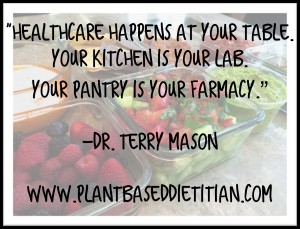 Just returned from an extraordinarily uplifting and powerful International Plant-Based Nutrition Healthcare Conference. Last year was their inaugural event and they doubled in size in this year’s second event. In attendance were approximately 400 physicians and dietitians representing about 15 different countries. Not only is the research database supporting the myriad benefits of plant-based diets expanding broadly and widely, but healthcare practitioners are seeing awe-inspiring results with their patients across multiple unique subspecialties. The message is clear and strong…a whole food, plant-based diet is the solution to our current healthcare crisis.
Just returned from an extraordinarily uplifting and powerful International Plant-Based Nutrition Healthcare Conference. Last year was their inaugural event and they doubled in size in this year’s second event. In attendance were approximately 400 physicians and dietitians representing about 15 different countries. Not only is the research database supporting the myriad benefits of plant-based diets expanding broadly and widely, but healthcare practitioners are seeing awe-inspiring results with their patients across multiple unique subspecialties. The message is clear and strong…a whole food, plant-based diet is the solution to our current healthcare crisis.
Here are 6 reasons why…
A whole food, plant-based diet:
1. Reduces risk of most chronic disease. Physicians Drs. Michael Klaper, Scott Stoll, Dean Ornish, John McDougall, Phil Tuso, Terry Mason, and James Loomis spoke of their years of success with patients, guiding and witnessing them getting healthier, losing weight, reducing medication use, ameliorating symptoms, and improving their overall wellbeing. Of course, this is being increasingly validated in the science as well (here and here).
 2. Is the only diet that has been shown to reverse disease. Up on the stage this week were both Drs. Dean Ornish and Caldwell Esselstyn, who were first to document the reversal of advanced coronary heart disease in their patients (here, here, here, and here). Dr. Neal Barnard has also effectively shown the reversal of type 2 diabetes (here and here).
2. Is the only diet that has been shown to reverse disease. Up on the stage this week were both Drs. Dean Ornish and Caldwell Esselstyn, who were first to document the reversal of advanced coronary heart disease in their patients (here, here, here, and here). Dr. Neal Barnard has also effectively shown the reversal of type 2 diabetes (here and here).
3. Has the potential to lower healthcare costs upwards of 70-80%. Experts hypothesize a dramatic savings in healthcare expenses because of decreased medication use, services, and procedures in people eating whole food, plant-based. Dr. Dean Ornish estimated that 75% of $2.8 trillion in U.S. health care costs are due to chronic diseases. Prevention is the key to massive savings.
4. Is sustainable (financially, patient-adherence-wise, environmentally, etc.). Eating plants is cost-effective, people love the food and stick to their meal plan, and it is the only way to reduce the massive impact livestock production has on global depletion.
 5. Supports the avoidance of food addiction and obesity. Processed foods (refined grains, sugars, oils, packaged foods, fried foods, fast foods) promote food addiction and obesity because they promote a heightened release of dopamine and because they have insufficient fiber and nutrients to achieve satiety. Animal foods are rich, calorically-dense, and typically served up with added fats and flavorings to enhance palatability. Thus, avoiding all of these products and replacing them with calorically-light, nutrient-packed vegetables, fruits, legumes, whole grains, and a bit of nuts and seeds is a win-win recipe for avoiding the vicious cycle exacerbated by the food industry. Additionally, large cohort studies (EPIC-Oxford, Swedish Mammography Cohort, and Adventist Health Study) show that the more animal products consumed, the higher the BMI.
5. Supports the avoidance of food addiction and obesity. Processed foods (refined grains, sugars, oils, packaged foods, fried foods, fast foods) promote food addiction and obesity because they promote a heightened release of dopamine and because they have insufficient fiber and nutrients to achieve satiety. Animal foods are rich, calorically-dense, and typically served up with added fats and flavorings to enhance palatability. Thus, avoiding all of these products and replacing them with calorically-light, nutrient-packed vegetables, fruits, legumes, whole grains, and a bit of nuts and seeds is a win-win recipe for avoiding the vicious cycle exacerbated by the food industry. Additionally, large cohort studies (EPIC-Oxford, Swedish Mammography Cohort, and Adventist Health Study) show that the more animal products consumed, the higher the BMI.
 6. Has the potential to increase lifespan. Dr. Dean Ornish has shown that lifestyle intervention (including a plant-based diet) can elongate telomeres, DNA proteins that, when shortened, have been shown to be a marker for disease and decreased lifespan. Mortality rates have consistently been shown to be lower for vegetarians when compared to meat-eaters (here, here, and an overview here).
6. Has the potential to increase lifespan. Dr. Dean Ornish has shown that lifestyle intervention (including a plant-based diet) can elongate telomeres, DNA proteins that, when shortened, have been shown to be a marker for disease and decreased lifespan. Mortality rates have consistently been shown to be lower for vegetarians when compared to meat-eaters (here, here, and an overview here).
Further Reading:
Benefits of a Plant-Based Diet
6 Steps Towards A Plant-Based Diet
5 Non-Nutritional Reasons To Go Meatless
Preventing and Reversing Disease With Plant-Based Diets
Plant-Based Diet TEDxConejo Talk




This Post Has 6 Comments
When considering the many benefits of going plant-based, the economy isn't usually one of them. But wow, the potential of a 70-80 percent reduction in health care costs out of our 2.8 trillion annual spending is phenomenally important! Great article, thanks.
THIS IS THE ONLY WAY TO LIVE A HEALTHY LIFE
Pingback: Vegan Health and Economics | Big Picture Vegan
Pingback: آنتن مركزي
Pingback: دوربين مداربسته
Pingback: دوربين مدار بسته